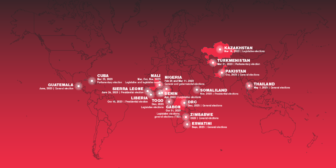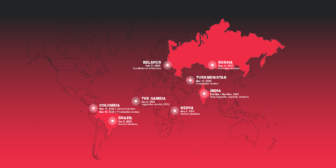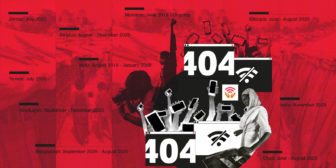Region: Turkmenistan

Who is shutting down the internet in 2023? A mid-year update
Since the beginning of 2023, governments around the world are discovering new reasons to disrupt internet access during key national moments.

Resurging internet shutdowns in 2022: weapons of control, shields of impunity

2023 elections and internet shutdowns watch
Governments around the world continue to shut down the internet during elections. Join our 2023 elections watch to #KeepItOn.

Digital dictatorship: authoritarian tactics and resistance in Eastern Europe and Central Asia
Dictators are using digital tools to repress and suppress democratic dissent, reinforcing digital authoritarianism. Our latest report looks at what’s happening in the EECA region, and how pro-democracy activists are fighting back against digital dictatorship.

Resisting the rise of digital dictatorship in Eastern Europe and Central Asia
“Digital dictatorship: authoritarian tactics and resistance in Eastern Europe and Central Asia” unpacks the tools of oppression in the region, and explores resistance.

#KeepItOn: 2022 elections and internet shutdowns watch
Elections and internet shutdowns are a disaster for democracy. See which countries the #KeepItOn coalition is watching in 2022.

#KeepItOn: Turkmenistan rips a page from the authoritarian playbook, digitally disconnects nation
Access Now and the #KeepItOn coalition are calling for a complete restoration of the internet across Turkmenistan.

#KeepItOn: 2022 elections and internet shutdowns watch
Elections and internet shutdowns are a disaster for democracy. See which countries the #KeepItOn coalition is watching in 2022.

What Turkmenistan internet shutdowns tell us about digital repression in Central Asia
Turkmenistan internet shutdowns are extreme. Here’s why the international community must take action to combat the wave of online censorship engulfing Central Asia.
Commonwealth of Surveillance States: The dangers of Russian-made surveillance technology
Access recently released a paper by Peter Bourgelais, an Access Tech Fellow, highlighting the growing electronic surveillance in post-Soviet Central Asia and the difficulties of regulating its manufacture and distribution. In Kazakhstan, Uzbekistan, Tajikistan, and Turkmenistan, Russian-made technologies and companies dominate the market, and techniques that have limited regulatory efficacy elsewhere — such as export controls and public campaigning — are much less effective.